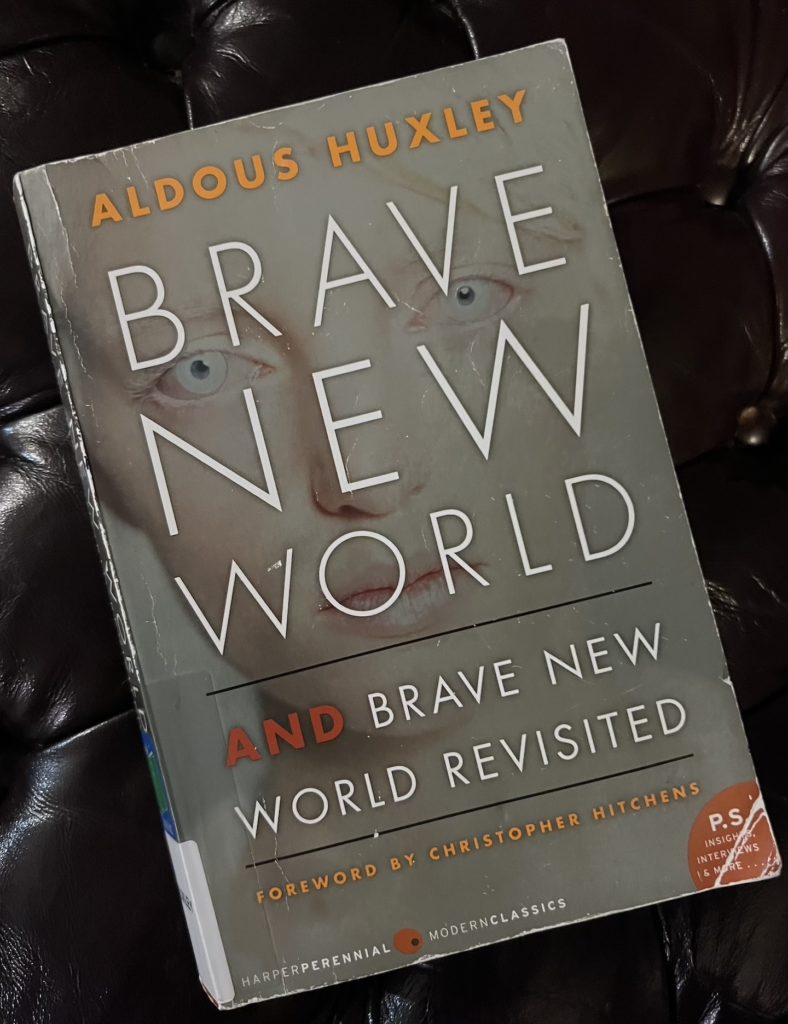“It suddenly struck me the other day that it might be possible to be an adult all the time.”
Every once in a while, a book club should read a classic dystopian novel.
Planetary Motto: Community, Identity, Stability
Have you ever wondered what a rational, engineered civilization would look like? One that prioritizes the happiness of its citizens above all? One where “there isn’t any serious need for a civilized man to bear anything that’s seriously unpleasant?” Where people are “adults intellectually and during waking hours, [however] infants where feeling and desire are concerned?” This is a curious thought-experiment; one that Aldus Huxley explores in Brave New World.
“History is bunk!” “Ending is better than mending.” These are two of the multitude of slogans that the civilized people of Brave New World are brainwashed into believing. No one questions or seeks the purpose of life. After all, “happiness is the sovereign good.” The citizens remain in a perpetual state of infantile adulthood where sexual promiscuity, regular drug use, extreme sports, exaggerated entertainment, and wanton consumption are not only encouraged by society, but are expected, if not required.
In this engineered world, eugenic science and technology are taken to the limit to create five castes of humans ranging from Alphas with superior human intelligence down to Epsilons with no human intelligence (“the lower the caste, the shorter the oxygen”). The Alphas are the leaders and intellectuals of the society whereas the lower castes are consigned to menial labor. This is a world of social slavery absolutes. Everyone is conditioned from bottle-birth (no human female involved) to adulthood to be content to do the jobs assigned to them. In their leisure hours, they are compelled to seek hedonistic pleasures.
It is bad to be alone. Therefore nothing is private. “Everyone belongs to everyone else.” There are no exclusive relationships, no families, no marriages, no children to raise. All activities are communal. Conflicts that arise are quickly snuffed out by a poof of soma, an idealized drug that puts people into a state of paradise.
Poof, and freedom is forever out of reach. Pleasurable slavery at the expense of art, science, philosophy and religion. As the Controller for Western Europe further explains, “We’ve got youth and prosperity right up to the end. What follows? Evidently that we can be independent of God…God isn’t compatible with machinery and scientific medicine and happiness. That’s why I have to keep these books locked up in the safe…People would be shocked.”
There are no books! Why do dystopias always deprive their citizens of books? Consider 1984 and Fahrenheit 451.
If we could plunk ourselves down into this Brave New World, just for a little bit, how might we react? Huxley has given us a hint. He takes a young man, John the Savage, who was born and raised outside of civilization, and thrusts him into this sensually-fulsome world. At first, John is patient and cooperates by trying to understand his experiences through the filter of Shakespeare. He falls in love with an Alpha woman. However, despite his efforts, his values are in constant clash with all that he sees. He wants to change this world, make it more human, more fallible. But they won’t let him. And they won’t let him return to his native land either. He is trapped. Do you think this is going to end well?
What are we to make of this mess? Why read it? Truly it is a precautionary tale.

My favorite sentence:
“Some men are almost rhinoceroses. They don’t respond properly to conditioning.’”
Thank you for this thought provoking review. Time to revisit “Brave New World”